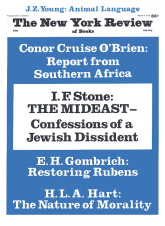In response to:
All or Nothing from the October 13, 1977 issue
To the Editors:
We would like to reply to Robert Coles’s thoughtful review of our book Psychiatric Terror: How Soviet Psychiatry Is Used to Suppress Dissent on only one point. It seems to us an important one.
Coles describes raising Soviet abuses with two official Soviet psychiatrists. Then he comments: “But I think Bloch and Reddaway underestimate the impact of a half a century of ideological indoctrination. The two doctors I talked with were not schemers, not mere cynical opportunists…. They believed what they said, and found my counter-assertions pitiably inadequate and self-serving.”
Here, it seems to us, Coles may not have taken into account the long Russian tradition of passionate lying for some “higher” purpose. Gogol and Dostoevsky provide numerous examples in literature, and Mr. Khrushchev did so in person. From the moment he goes into action, the liar quickly convinces himself of the truth of his own lies. The same tendency can sometimes be observed in certain Western politicians.
It was to demonstrate how close colleagues of Coles’s two psychiatrists have lied in the service of the Soviet state since 1971 that we documented in such detail their systematic mendacity and deception, and their manipulation of foreigners (see chapters four, five, and ten). Since our book appeared, they have not, significantly, courted further exposure by trying to claim that any episode is inaccurately described or that we have libelled them. They have been “rumbled,” and are intelligent enough not to draw further attention to the fact. For they are revealed in these episodes as being—beneath the smooth, apparently confident exterior—furtive, cunning, and very defensive.
None of this is surprising. A career in the Soviet bureaucracy (of which medicine is an integral part) teaches the most adaptable and ambitious aspirants to combine these qualities with the ability to appear to demonstrate what Coles saw—“complete assurance.” Mr. Brezhnev was trained in the same school.
Doubtless the self-esteem and motives of such people vary, but it is perhaps worth recounting what happened a few years ago in the home of a German friend of one of us. A top Soviet official writer—roughly equivalent in rank to Professor Snezhnevsky in psychiatry, and a passionate denouncer of the West and affirmer of all things Soviet—took a history of Soviet literature out of the German’s bookshelf. Turning to the page featuring his own photograph, he wrote across it: “This person is the biggest bastard in the whole of Soviet literature”—and signed his name. It was a solemn if private act of confession and apology.
If Western psychiatric leaders, and politicians, are culture-bound, they will have little idea how to deal successfully with their opposite numbers. We hope our book may contribute to making their task somewhat less difficult.
Peter Reddaway
Sidney Bloch
London, England
Robert Coles replies:
I repeatedly checked with officials of Amnesty International about Chile, Argentina, South Africa, but was told that there was no hard evidence of the kind of “psychiatric terror” Bloch and Reddaway are able to document so carefully in their book. (It is known that several psychiatrists have been kidnapped, killed in Argentina by various rightwing terrorist groups, on the hunt for “enemies.”) We have not been shown that the governments of Chile or Argentina are using doctors to intimidate or torture political critics. Indeed even severe opponents of the two juntas in question have not made such a case. As for South Africa, I do indeed know, from first hand observations, what happens in that nation’s private hospitals with black patients—a terrible tragedy, but not an example of a government’s use of psychiatry to discourage political dissent. The South African government jails its opponents.
Two of the letters make important and justifiable criticisms of America’s penal system—the use of psychiatry (including behavior modification and drugs) to coerce political activists of various kinds. When I lived in the South, in the early 1960s, and worked in the civil rights movement, I saw psychiatric labels used all the time to denigrate SNCC workers. A few years ago, as a member of the Committee for Public Justice, I visited Soledad and Vaccaiville in California, where, unquestionably, vocal opponents of this society, especially those who belong to minority groups, have to contend, daily, with psychiatric coercion: tranquilizers used by jailers to bring silence, and various “conditioning techniques” similarly employed: isolation, food deprivation, especially burdensome work. I hate to nit-pick. I think Tom Szasz richly deserves the repeated commendations he has received from the ACLU; he’s given American psychiatry the hard look it deserves. But neither the southern states in the 1960s nor the federal government have arrested their various critics, charged them with insanity, and punished them as “treatment.” Those who are in prison are there for other reasons—maybe wrongly so, in some cases. They’ve been arrested and charged with various crimes—again, maybe wrongly so in instances. Things are bad enough for many of this nation’s poor; and it has often been no picnic for our radical critics, but I don’t think we help anyone here by insisting that our flaws and injustices are similar to those in the Soviet Union. There are explicit and important differences between the two societies, and Bloch and Reddaway spell cut, convincingly, one such distinction.
As for the two Soviet psychiatrists Bloch and Reddaway mention in their letter, they may well have been lying to me. Short of a lie-detector examination, there was no way for me to know whether the two doctors were consciously deceptive, or all too convinced ideologues—or maybe, a mix of the two.
This Issue
March 9, 1978



